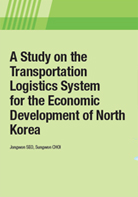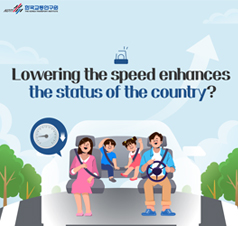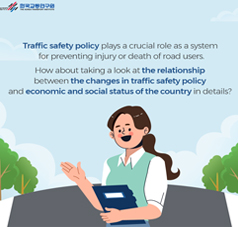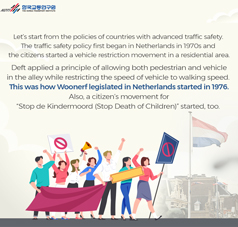Newsletters

NEWS
KOTI - Korea Transport institute
Feeds and Updates
KOTI NEWSLETTER July, 2021
July 28 2021
2021 07

Major events of the month
Korean New Deal Listening and Sympathy Gangwon Great Debate
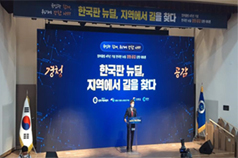
The 「Korean New Deal Listening and Sympathy Gangwon Great Debate, Finding a Way in the Region!」 was held at the main conference room of Chuncheon City Hall for two days from June 22nd to 23rd, which was co-organized by the Korea Transport Institute and the Gangwon Research Institute, and co-hosted by the Presidential Commission on Policy Planning, the National Research Council for Economics, Humanities and Social Sciences, Gangwon Province and Chuncheon City. The event was held online and offline in order to comply with the social distancing guidelines, and over two days, officials from firms, universities, research institutes, and governments by field participated in each session for active presentations and discussions based on the contents presented so far.
On the first day, Tuesday, June 22nd, there was a special lecture by the vice minister of Health and Welfare following the opening remarks by Cho Daeyop, chairman of the Presidential Commission on Policy Planning. In the first session, Chu Jangmin (chairman, Presidential Committee for Sustainable Development) chaired the meeting under the theme of 'Korean New Deal and Green Energy', and in the second session, Jeong Seongheon (head, Korean New Deal Advisory Group) chaired it under the theme of "Korean New Deal and PeaceLife Economy". On the second day, Wednesday, June 23rd, in the third session, Lee Kiwon (professor, Hallym University) chaired it under the theme of 'Korean New Deal and Local Economy', and in the fourth session, Kim Dongwon (professor, Kangwon National University) chaired it under the theme of 'A Just Transition of the Regional New Deal and Social Dialogue'.
Held a Roundtable Conference, "The Future of Mobility, Autonomous Driving and (Smart) Infrastructure"
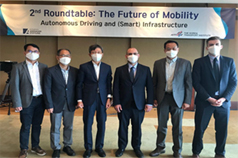
The Korea Transport Institute held a roundtable conference on Wednesday, June 30th at the Grand Hyatt Seoul under the theme of "The Future of Mobility, Autonomous Driving and (Smart) Infrastructure". Starting with a welcome speech by Thomas Yoshimura, director of the KAS, problems and future development directions were discussed by Oh Jaehak (president, Korea Transport Institute), Kim Youngho (director, Dept. of Metropolitan Transport), Kang Kyungpyo (director, Center for Connected and Automated Driving Research), Christoph Stiller (professor, KIT), Dr. Thomas Otto, Dr. IIja Radusch, Yeo Hwasoo (professor, Korea Advanced Institute of Science and Technology), and Dr. Junwoo Son (Daegu Gyeongbuk Institute of Science and Technology) in connection with road facilities and infra structure in accordance with the advancement of autonomous driving technology.
Debate on The Impact of COVID-19 on The Transportation and Logistics Sector and Inclusive Recovery Policy Plans
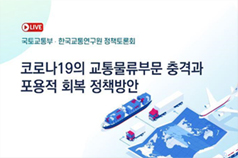
The Korea Transport Institute held a live-streamed YouTube forum on the 'Impact of COVID-19 on the Transportation and Logistics Sector and Inclusive Recovery Policy Plans' jointly hosted by the Ministry of Land, Infrastructure and Transport in the conference room on the 2nd floor from 14:00 on Friday, July 2nd. Following the opening remarks by Oh Jaehak, president of the institute, announcing the opening of the forum, and the congratulatory remarks by Lee Seonha, president of the Korean Society of Transportation, presentations
were made by topic as follows: Changes and prospects of public travel behavior due to COVID-19 (Jang Dongik, associate research fellow, Korea Transport Institute); Impact on the passenger transport industry and countermeasures (Im Seohyun, head, Division for Transport Industry and Mobility); Impact on the aviation industry and countermeasures (Song Gihan, director, Dept. of Aviation) ; Establishment of daily logistics system to support non-face-to-face economic activities (Seo Sangbeom, director, Center for Logistics Company and Smart Logistics Facilities Certification) ; Support of the transportation industry and recovery of transportation services to overcome COVID-19 (Kim Sunghwan, secretary, Transport Policy Coordination Division, Ministry of Land, Infrastructure, and Transport). Chaired by Ye Chungyeol, head of the Major Government Projects Research Center, Korea Transport Institute, Hwang Byungtae (managing director, National Federation of Bus Transport Business Associations), Cha Dongho (advisor, CJ Logistics), Lee Sin (general manager, Korean Air), Shin Heechul (director, Dept. of The Fourth Industrial Revolution & Transport, Korea Transport Institute), Seo Hyeongseok (reporter, Dong-A Ilbo), and Park Jihong (manager, Transport Policy Coordination Division, Ministry of Land, Infrastructure, and Transport) participated as panelists and had an in-depth discussion based on the presentations.
Traffic Safety Seminar on The Traffic Safety Performance and Future Tasks of Moon Jae-in Government
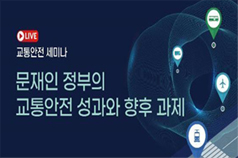
A seminar under the theme of "Traffic Safety Performance and Future Tasks of Moon Jaein Government" was held at the Kensington Hotel Yoido, on Thursday, July 8th, which was co-organized by the Korea Transport Institute and the Presidential Commission on Policy Planning, and hosted by the National Assembly Forum on Traffic Safety.The purpose of this seminar was to evaluate the performance of major traffic safety policies related to the reduction of deaths from traffic accidents in Korea after 2017, and to share and
spread the successful results with the public. Starting with the opening remarks by Oh Jaehak, president of the Korea Transport Institute, there were welcoming speeches by Yun Gwanseok, member of the National Assembly, and Cho Daeyop, chairman of the Presidential Commission on Policy Planning, and congratulatory speeches by Jung Haegu, chairperson of the National Research Council for Economics, Humanities and Social Sciences. Veronique Feypell, manager of the Road Safety Program (OECD/ITF), made a presentation under the theme of the "Framework of Achievement in Traffic Accidents Through International Comparison", and Han Sangjin, director of the Center for Korea Transport Institute, made a presentation under the theme of "Current Government Performance and Evaluation in Traffic Safety Sector". With professor Hwang Kiyeon as a chairperson, the discussion among experts from firms, university, research institutes and government such as Kang Sungseup, manager of the Ministry of Land, Infrastructure, and Transport, and Yang Woochul, manager of the National Police Agency, was relayed through YouTube.
Public Hearing on the 2nd Basic Plan for Development of Sustainable National Transport Logistics
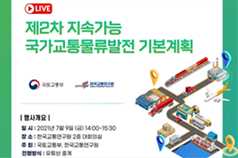
The Korea Transport Institute held a public hearing on the '2nd Basic Plan for Development of Sustainable National Transport Logistics' which was jointly hosted by the Ministry of Land, Infrastructure and Transport in the conference room on the 2nd floor on Friday, July 9th. The public hearing was held online in accordance with the COVID-19 social distancing guidelines. This second basic plan was a statutory 10 year official plan to set the basic direction of sustainable transport logistics policies in response to changes in transport logistics conditions
such as climate change and energy crisis after the first plan was established in 2011. After Park Sangjun, research fellow of the Korea Transport Institute, presented the topic, experts from each field such as Park Mincheol, professor of the Korea National University of Transportation, Park Byeongjeong, professor of Myongji University, and Han Sangyong, professor of Dongseo University, participated as panelists to discuss the mid- to long-term goals and strategies of sustainable transport and logistics policies for the realization of 2050 carbon neutrality.
Seminar Series on KOTI's 2020 Research Performance First: 'Transition to a People-centered Transportation System And Strengthening Public Transportation'
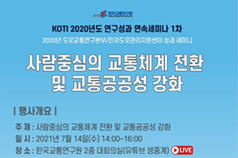
The Korea Transport Institute planned seminar series on 2020 Research Performance from Wednesday, July 14th to Wednesday, July 28th to share major research achievements in 2020 and seek efficient policies in related fields. The seminar series would be held over a total of 6 times, among which the 1st seminar was held under the theme of 'Transition to a People-centered Transportation System and Strengthening Publicness of Transportation' led by the Department of Road Transport, and the Center for Private Highway Studies, Korea Transport
Institute on Wednesday, July 14th, and it was broadcast in real time on YouTube of the Korea Transport Institute without an on-site audience due to COVID-19. In the first seminar, starting with the greetings of Oh Jaehak, president of Korea Transport Institute, speakers presented each topic as follows; 'Paradigm shift in urban transport policy focused on national health and traffic safety' by Woo Seungguk, head of Division for Traffic Operation and Pedestrian Research; 'Improvement of driving license system for the elderly drivers and measures to provide mobility' by Han Sangjin, director of Center for National Transport Safety and Disaster Prevention; 'Proposal for user-friendly operation for private road users' by Jang Hanbyeol, head of Division for Toll Management; 'Empirical analysis of toll reduction effect on toll roads and application plans of business restructuring' by Jung Yujin, associate research fellow. In a subsequent discussion session with Sung Nakmun, vice-president of Korea Transport Institute as moderator, Seo Jiwoong, secretary of Department of Roads and Transportation, Ministry of Land, Infrastructure and Transport, Chu Sangho, professor of Hongik University, Dr. Seol Jaehoon, former researcher of Korea Transport Institute, and Dr. Oh Sunghoon researcher of Architecture & Urban Research Institute, participated as panelists to discuss the presented topics.
Signed a Business Agreement Between the Korea Transport Institute and the Korea Institute of Urban Planners
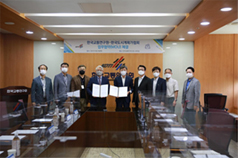
The Korea Transport Institute (Oh Jaehak, president) signed a business agreement with the Korea Institute of Urban Planners (Kim Hongbae, president) on Thursday, June 24th. Through this agreement, they promised to cooperate faithfully based on mutual respect and trust in order to strengthen research capabilities and competitiveness and further contribute to national, regional and urban development through conditions as follows: Discovery and promotion of joint research projects; Sharing·utilizing·exchanging of research data; Co-hosting and cooperation of academic events such as seminars and workshops home and abroad; Matters necessary for maintaining a prosperous exchange and cooperation relationship; Other necessary matters to achieve the purpose of this agreement.
Contribution & Press activity
[Contribution] Concerns About Building an Efficient Arterials
![[Contribution] Concerns About Building an Efficient Arterials](https://www.koti.re.kr/resources/kor/images/newsletter/202107/magazinimg01.jpg)
Attempts to designate and construct a new type of arterial road are necessary to establish an efficient road network. Ten Year Comprehensive National Road Networks Plans, Five Year Construction Plans of Expressways, and National Highway and Nationally Supported Local Road Construction Plans are being established. As the road has been extended, various attempts are needed to rebuild it more efficiently than the existing arterial road network. It is expected that successful road planning and efficient road network management will be achieved through the continuous efforts and interest of related agencies to closely analyze road use patterns and improve road connectivity. View Contribution
[Contribution] Nudge for Pedestrian Safety
![[Contribution] Nudge for Pedestrian Safety](https://www.koti.re.kr/resources/kor/images/newsletter/202107/magazinimg02.jpg)
Among the representative nudges used in the transportation field related to the implementation of the safe speed 5030 policy from April 17, nudges to improve pedestrian safety were introduced. Increasing the size or changing the color of the numbers 50 and 30 on the dashboard of a new vehicle, securing waiting space in the middle of the crosswalk, installing a pedestrian pushbutton signal on wide roads with few people, reducing the width of lanes on urban roads or installing nudges to reduce pedestrian traffic accidents is not a policy that entails large costs, but the effect for pedestrian safety is very large, so do not hesitate to introduce nudges for pedestrian safety. View Contribution
Policy Research Reports
A Study on Diverse Preference for Driving Behaviors of Automated Vehicles and Simulation Methodology for its Impact on Traffic
During the Fourth Industrial Revolution, automated driving technology has gradually been implemented while there have been continual calls for the need to analyze the development of automated driving technology and its impact on the transportation sector. As a response to changes caused by emerging technologies, the introduction of fully self-driving vehicles and the establishment of their operating policies/regulations; accurately identifying the impact of auto
mated driving on traffic flow, road capacity, and traffic safety, is the most important research field for the transportation network of the future.Ultimately, for the automated vehicle to be widely accepted by road users, it is necessary to determine whether the automated vehicle can provide the users' desired driving experience. This need may require analyses of variations in the driving behavior of automated vehicles and the impact of these variations on the traffic system.A driver may show different driving behaviors depending on their unique characteristics or the surrounding stimuli at the time of driving, and one may argue that the user preferences reflected in such variation in driving behaviors should be considered in automated vehicle driving features. In fact, automated driving technology, or driving assistance technology in current commercial vehicles, is able to set the level of driving automation according to user preferences.We should acknowledge the need to analyze traffic operation management due to automated traffic systems coming online, and it is also necessary to develop a method of traffic operation and management that considers automated vehicles.Therefore, this study will focus on the analysis of user preference with automated vehicle behaviors, microscopic traffic simulation, and the impact on traffic operation and management. Based on the preliminary results of this study, we will address potential projects to suggest transportation policy.
370 Sicheong-daero, Sejong-si, 30147, Republic of Korea
TEL. 044-211-3114 FAX. 044-211-3222
Copyrightⓒ THE KOREA TRANSPORT INSTITUTE All rights reserved

Click here to receive traffic research trends and news about researchers through KakaoTalk.
